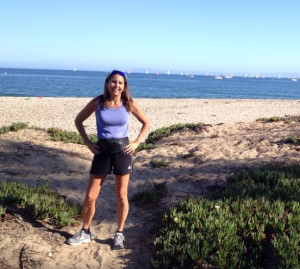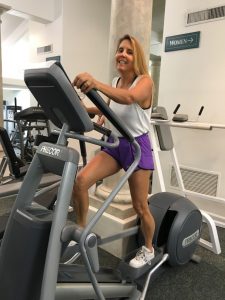 The secret to my overall success, both professional and personal, is that I made a conscious choice to live my life by one guiding principle: Live life first, and be diabetic second. In the beginning, I’m not sure it was even a conscious choice (I was only four years old when diagnosed with type 1 diabetes), but rather just an integral part of my personality. I am not one to let obstacles keep me from reaching my goals. Having diabetes has undeniably been one of the greatest challenges to living my life the way I want to, but it has almost never been an insurmountable one.
The secret to my overall success, both professional and personal, is that I made a conscious choice to live my life by one guiding principle: Live life first, and be diabetic second. In the beginning, I’m not sure it was even a conscious choice (I was only four years old when diagnosed with type 1 diabetes), but rather just an integral part of my personality. I am not one to let obstacles keep me from reaching my goals. Having diabetes has undeniably been one of the greatest challenges to living my life the way I want to, but it has almost never been an insurmountable one.
It’s hard to even imagine life without diabetes when you get it as young as I did. I don’t remember much about being diagnosed other than feeling sluggish and tired all the time. The biggest irony was that my mother had avoided becoming a nurse because she hated needles, but the doctors wouldn’t let me out of the hospital before she learned how to give me shots. She apparently practiced for days shooting water into an orange all week. When she gave me my first shot in my arm, she jabbed the needle so hard it rebounded back out. I am told I said, with tears streaming down my face, “Mommy, go practice on the orange some more.”
Diabetes has, in many ways, been a blessing in disguise. It likely had a positive impact on my family’s overall health because our whole family switched to the same diet that was prescribed for me at the time—a balanced diet of carbs, protein, and fat with lots of vegetables, some fruit, and very limited intake of sweets and refined foods.
Having diabetes has also been a positive, shaping force in my life when it comes to exercise and physical activity, and I have amended my guiding principle to include, “…and be active” for that reason. While many people view exercise as a punishment, I fully embrace using diabetes as an excuse to put my workouts first! I started exercising regularly way before it was trendy and known to be good for your health (and blood glucose). I was always active as a kid, playing in the woods, building forts, and just being a tomboy. As a preteen, I began exercising regularly on my own and doing organized sports because being active was the only thing that made me to feel like I had any control over my blood glucose. Way back then no one had blood glucose meters (only inaccurate urine testing), but I could tell being active helped with my blood glucose.
To this day, I still exercise six to seven days a week, and my passion is helping others with all types of diabetes do the same—safely, effectively, and for a lifetime. I personally vary my daily workouts to keep them fun and to stay injury-free and advise everyone else how to do so. When people ask me how I manage to do all I do, I tell them simply, “I work out.”
Diabetes also led me to an early calling as a healthy lifestyle and diabetes motion expert. When I was about twelve, I spent a week in Kansas with my grandmother, who had what they called “borderline” type 2 diabetes. She was on yet another diet to lose weight, and I decided to help her with dieting while I was there—acting like a personal trainer or fitness coach. I weighed her in every morning, helped her measure out her food (like cottage cheese), and made her jog laps around her backyard. At the start of the week, she agreed to pay me $1 for every pound she lost with my help. She lost eight pounds that week—was I ever a rich kid! Little did I know back then that she likely lost a whole lot less after the first week and gained it all back over time. I just remember her always being about the same body size and shape every time I saw her.
Back then my grandmother was the only other person I knew with diabetes. Later on when I was in graduate school working on my first degree in exercise physiology, she starting suffering from myriad complications including a heart attack, followed two years later by a major stroke and smaller ones that eventually left her incapacitated. She was bed bound and unable to communicate or feed herself for most her last six years, and she had partial amputations of both of her legs due to chronic ulcers. During one visit, I looked at her and thought, I don’t want to live like that.
 Consequently, most of my life and career I have focused on how to stay healthy with diabetes and avoid complications. To me, what’s most important is living well while you are alive. That’s why I preach about how important a healthy lifestyle is to maintaining your quality of life (whether you have diabetes or not) and that just living a long time without health should not be your goal.
Consequently, most of my life and career I have focused on how to stay healthy with diabetes and avoid complications. To me, what’s most important is living well while you are alive. That’s why I preach about how important a healthy lifestyle is to maintaining your quality of life (whether you have diabetes or not) and that just living a long time without health should not be your goal.
You certainly don’t have to get a PhD in exercise physiology like me to understand the metabolic changes that occur with exercise, but learning why it is so beneficial can be very motivating. You can virtually “erase” overeating mistakes with exercise, and you can keep yourself from getting other health conditions (like heart disease). I’m sure that I am only in excellent health after almost 50 years with type 1 diabetes because of my lifestyle choices—and I want to stay that way until I reach my last day.
As I always say, “What’s the point of living longer if you can’t live well and feel your best every day of your life?” Take my advice and live life first, be diabetic second, and stay as active as you possibly can every day of your healthy (and hopefully long) life.
Reprinted with permission from Sheri Colberg.
Sheri R. Colberg, PhD, FACSM, is a Professor Emerita of Exercise Science at Old Dominion University and a former Adjunct Professor of Internal Medicine at Eastern Virginia Medical School. She is an internationally recognized authority on diabetes and exercise. She is the founder of Diabetes Motion (www.diabetesmotion.com), a free website to help people with diabetes be active, as well as Diabetes Motion Academy (www.dmacademy.com), which provides programs and resources for PWD, fitness and healthcare professionals, and others.
